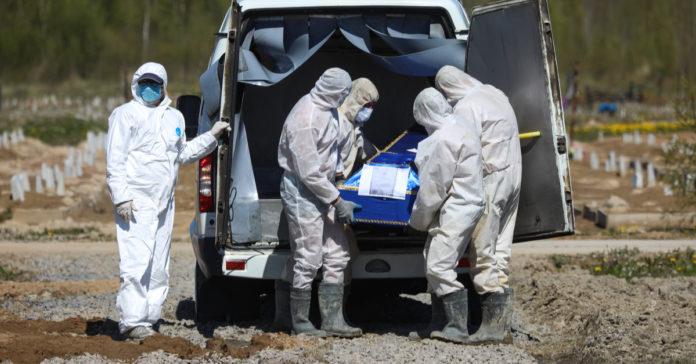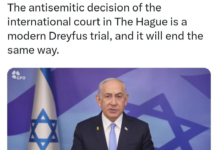Muslims in Britain should prepare for more coronavirus-related deaths, Islamic burials under new conditions, and state emergency rule, writes Jahangir Mohammed.
This is the most depressing article I have written on a UK issue, but it has to be done so Muslims can plan and deal with the reality ahead.
After three weeks of debating whether we should heed medical advice and stop congregational prayers at mosques, and most likely having spread coronavirus in the community via the mosques, the stark reality of the COVID-19 pandemic and the increasing death toll has finally hit home.
Muslim communities were alerted to this reality by the UK government’s Coronavirus Emergency Powers Bill, which sought to disapply a section of the Public Health (Control of Diseases) Act 1984 to allow cremation of a dead body against people’s wishes, as a last resort. The thought of deceased Muslims being cremated served as a great wakeup call. That power has now been granted along with many others and the Coronavirus Act 2020 is in now in force. Muslims will hopefully not be cremated as long as their wish is expressed, and we should encourage all Muslims to maintain a written record of their wish not to be cremated.
Preparing for death
Across the country, as Muslims started dying from contracting COVID-19, local communities and mosques committees eventually got their acts together, started planning for large number of deaths and burials.
They began engaging with their local authorities and health agencies. These are difficult and unprecedented times for Muslims in the UK, it is the first time that we have had to deal with large numbers of deaths on our own shores.
Subscribe to our newsletter and stay updated on the latest news and updates from around the Muslim world!
So far, the local responses have been encouraging, local attempts at co-ordinated efforts are taking place. People are looking at streamlining procedures for burials, giving advice to communities, creating extra storage and burial space, and getting the right Personal Protective Equipment (PPE) in place to carry out burials. There are also hotlines and contacts for communities in some of the major cities.
This response, within a week, is heartening to see, and probably the first time Muslim communities across sectarian differences have started to work together locally. While some differences of religious opinions exist over issues of whether the dead body of someone who contracted COVID-19 requires washing or not, such differences will inevitably disappear as the reality of numbers of deaths and pressure of washing or lack of volunteers kicks in.
How many Muslim deaths should we expect?
For some in the community, the number of expected deaths and their consequence, both during this period and the economic difficulties after, have not yet fully sunk in. Whilst a scientific method of calculating the expected number of deaths, especially for Muslims, is likely to prove difficult, there are some estimates, and it is possible to project from this what level of Muslim deaths we should plan for.
One worst case scenario of deaths for the UK is that there will be 250,000 deaths up to 2021. It could be more if the pandemic enters a second year, or the virus mutates. The best outcome for the UK is predicted to be 20,000 deaths for the same period.
Muslims make up around 6.3% of the UK’s total population. All other things being equal, we would expect the Muslim death toll to be proportionate to that of the rest of the UK. That would mean a worst-case scenario of 15,750 deaths out of the 250,000 could be Muslims. A best-case scenario would be of 1,260 Muslim deaths out of 20,000.
However, many factors would mitigate against deaths being proportion to the general population as a whole. We know that the death rate among the elderly and those with heart disease and diabetes are the biggest categories globally for death from coronavirus.
The Muslim population profile is younger than the indigenous non-Muslim population, which has a greater proportion of elderly (across Europe). Therefore, we should expect that population to have a higher death rate, than that of the Muslim and immigrant descent community. This may well still be the case.
However, other factors in the Muslim community may even out those differences. The Muslim population in Britain, specifically South Asians who make up the demographic majority, have much higher rates of heart disease and diabetes than the indigenous population.
Additionally, non -Muslim elderly tend to live more in isolation while Muslim elderly tend to live in larger extended families and households. In some communities, the average family size is five, excluding elders and siblings. A larger proportion of Muslim communities also tend to live in densely populated areas (particularly in the Midlands, Lancashire and Yorkshire in outdated terraced housing, in close proximities with each other). In these areas, young children often act as carers for elders and siblings who are ill.
We can also add to this to the fact that most Muslim men across the country attend Friday prayers every week, and most children attend madrassah or Quran classes after school, which would enhance the rate of spread. Within Muslim communities, some have a larger elderly population and family size. This means social distancing has been much more difficult to achieve in practice.
These factors would tend to cancel out any the difference in age of population of the indigenous community, so an expected death rate is in line with the percentage of population or a slightly higher rate above 6.3% of the population, perhaps around 8% would not be unrealistic.
Based on this we, could be looking at a best outcome of 1,260 -1,600 Muslim deaths, and a worst-case scenario of 15,750 – 20,000 Muslim deaths. The highest concentrations could be in some Muslim cluster areas in London, the Midlands, Lancashire and Yorkshire. We should of course ask Muslim funeral directors to record the number of burials they perform related to COVID-19.
Everything is in the hands of Allah (subhanahu wa ta’ala), and we pray the death remain as low as possible.
Emergency Rule.
As of 26th of March 2020, the British state, police, army and local authorities were granted temporary powers of an emergency state. This introduced powers to disapply rights that existed under a plethora of existing laws. Despite this, some Muslims do not appear to have accepted this new reality, or have disregarded it, and tried to continue as normal. The odd mosque has also reportedly continued to hold congregational prayers. The police and local authorities now have an extended range of powers to apprehend, spot fine, arrest and detain individuals who disobey government guidelines and advice on social distancing and mitigating public health risks. The powers also allow the police to stop events and gatherings and close or takeover mosques, and buildings.
No individual or organisation should be engaging in activities and behaviours outside of the guidelines issued by the government or try to circumvent them. If the Muslim community believes some of those restrictions or powers need easing or amending, they need to make a responsible and reasonable case for their review, not attempt to justify their own wishes. The government will be reviewing guidelines on a regular basis.
Preparing for Ramadan.
It is very likely that mosques will not be allowed to hold congregational prayers this Ramadan. There will most likely be no charity events or community iftars and street collections. Whilst this will be a challenge for many mosques and charities, adversity also presents opportunities and a chance for creativity. I know that many mosques and charities have been taken out of their comfort zones and are thinking of and planning interesting initiatives.
Time will tell whether they can meet the challenges of the future. The next two months also offers Muslim families the chance to rethink and re-orient their lives and relationships in a much more positive and constructive God-conscious way.
Times of hardship and adversity should be treated as a learning curve, and a blessing and mercy from Allah. Despite the reality of deaths and burials, I am optimistic that Muslim communities and wider society will meet these challenges with great resolve and renewal.




















